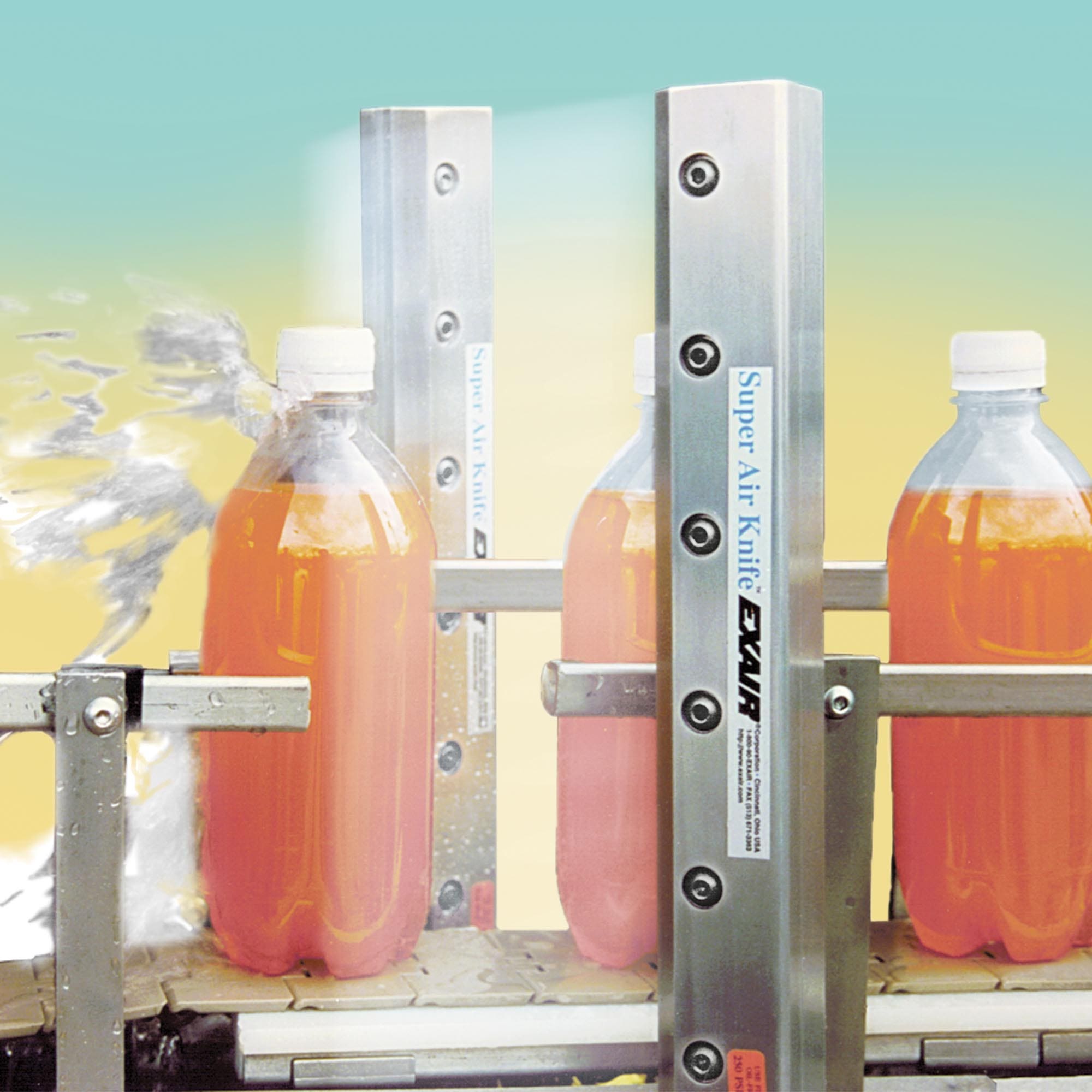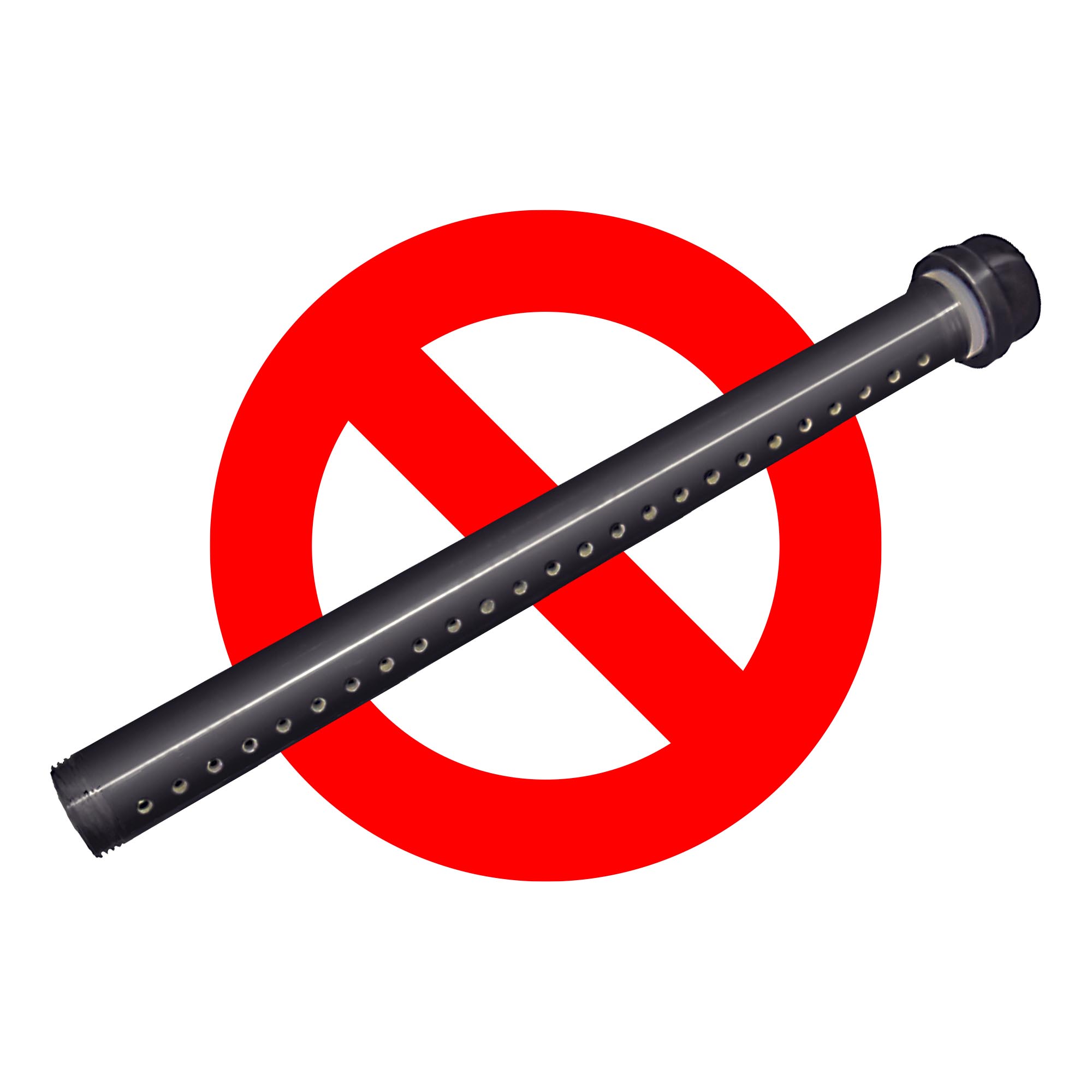Compare These Blowoffs
There are a variety of ways to blow the water from the bottles shown in the photo below, but which method is best? The following comparison of drilled pipe, flat air nozzles, a blower and the Super Air Knife proves that EXAIR has the best choice for your blowoff, cooling or drying application.

Our goal for each of the blowoff choices was to use the least amount of air possible to get the job done (lowest energy and noise level). Compressed air pressure required for each was 60 PSIG (4.1 BAR) which provided adequate velocity to blow the water off. The blower used had a ten horsepower electric motor and was a centrifugal type blower at 18,000 RPM. The table at the bottom of the page summarizes the overall performance. Since your actual part may have an odd configuration, holes or sharp edges, we took sound level measurements in free air (no impinging surface).
 |
Drilled Pipe
This common blowoff is very inexpensive and easy to make. For this test, we used (2) drilled pipes, each with (25) 1/16" (1.6mm) diameter holes on 1/2" (13mm) centers. As shown in the test results below, the drilled pipe performed poorly. The initial cost of the drilled pipe is overshadowed by its high energy use. The holes are easily blocked and the noise level is excessive - both of which violate OSHA requirements. Velocity across the entire length was very inconsistent with spikes of air and numerous dead spots.
 |
Flat Air Nozzles
As shown below, this inexpensive air nozzle was the worst performer. It is available in plastic, aluminum and stainless steel from several manufacturers. The flat air nozzle provides some entrainment, but suffers from many of the same problems as the drilled pipe. Operating cost and noise level are both high. Some manufacturers offer flat air nozzles where the holes can be blocked - an OSHA violation. Velocity was inconsistent with spikes of air.
 |
Blower Air Knife
The blower proved to be an expensive, noisy option. As noted below, the purchase price is high. Operating cost was considerably lower than the drilled pipe and flat air nozzle, but was comparable to the EXAIR Super Air Knife. The large blower with its two 3" (76mm) diameter hoses requires significant mounting space compared to the others. Noise level was high at 90 dBA. There was no option for cycling it on and off to conserve energy like the other blowoffs. Costly bearing and filter maintenance along with downtime were also negative factors.
 |
EXAIR Super Air Knife
The Super Air Knife did an exceptional job of removing the moisture on one pass due to the uniformity of the laminar airflow. The sound level was extremely low at 65 dBA. For this application, energy use was slightly higher than the blower but can be less than the blower if cycling on and off is possible. Safe operation is not an issue since the Super Air Knife cannot be dead-ended. Maintenance costs are low since there are no moving parts to wear out.
Blowoff Comparison |
||||||||||
| Compressed Air | Horsepower Required | Sound Level | Purchase Price | Annual Electrical Cost | Approx Annual Maintenance Cost | First Year Cost | ||||
| Type of Blowoff | PSIG | BAR | SCFM | SLPM | dBA | USD | USD | USD | USD | |
| Drilled Pipes | 60 | 4.1 | 174 | 4,294 | 35 | 91 | $50 | $4,508 | $920 | $5,478 |
| Flat Air Nozzles | 60 | 4.1 | 257 | 7,273 | 51 | 102 | $208 | $6,569 | $1,450 | $8,227 |
| Blower Air Knife | 3 | 0.2 | N/A | N/A | 10 | 90 | $5,500 | $1,288 | $1,500 | $8,288 |
| Super Air Knife | 60 | 4.1 | 55 | 1,557 | 11 | 69 | $650 | $1,417 | $300 | $2,367 |
|
*Based on national average electricity cost of 8.3 cents per kWh. Annual cost relects 40 hours/week, 52 weeks/year. |
||||||||||
